北师大七年级英语下第一单元第一课
北师大版七年级英语下册Unit 1 Lesson 1 第2课时教学课件(9张)
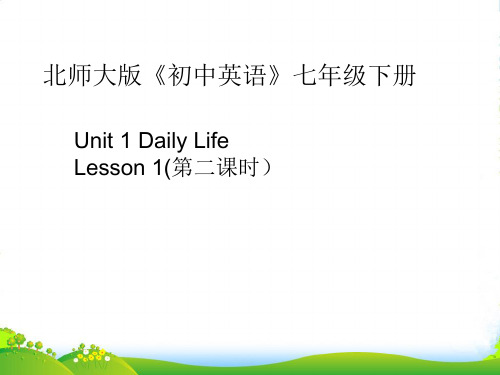
北师大版《初中英语》七年级下册
Unit 1 Daily Life Lesson 1(第二课时)
Mon. Tue. Wed.
Thur. Fri.
16:00 basketballeyball _19:00____TV-news
16:00 Drum___Club_______ 19:00 TV-news 20:00 TV-football match
Find incorrect sentences below and then correct them.
1.Always,they read books in the evening. ually,he does his homework in his bedroom. 3.We watch the evening news sometimes. 4.She goes to clubs after school seldom.
Work in pairs:
Interview your partner and then complete the table with the words always,usually,sometimes,seldom,
never.
1、人才教育不是灌输知识,而是将开发文化宝库的钥匙,尽我们知道的交给学生。 2、一个人的知识如果只限于学校学习到的那一些,这个人的知识必然是十分贫乏的2021/10/142021/10/142021/10/1410/14/2021 4:29:54 PM 3、意志教育不是发扬个人盲目的意志,而是培养合于社会历史发展的意志。 4、智力教育就是要扩大人的求知范围 5、最有价值的知识是关于方法的知识。 6、我们要提出两条教育的诫律,一、“不要教过多的学科”;二、“凡是你所教的东西,要教得透彻”2021年10月2021/10/142021/10/142021/10/1410/14/2021 7、能培养独创性和唤起对知识愉悦的,是教师的最高本领2021/10/142021/10/14October 14, 2021 8、先生不应该专教书,他的责任是教人做人;学生不应该专读书,他的责任是学习人生之道。2021/10/142021/10/142021/10/142021/10/14
北师大版英语七年级下册Unit 1 Daily Life Lesson 1 After School
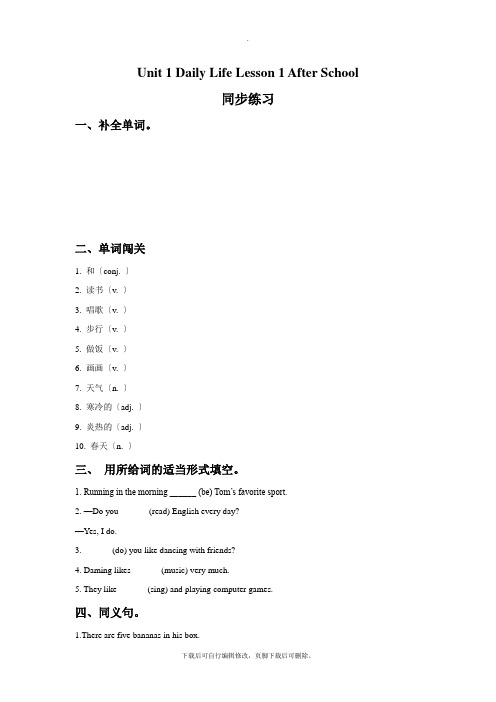
Unit 1 Daily Life Lesson 1 After School同步练习一、补全单词。
二、单词闯关1. 和〔conj. 〕______________2. 读书〔v. 〕______________3. 唱歌〔v. 〕______________4. 步行〔v. 〕______________5. 做饭〔v. 〕______________6. 画画〔v. 〕______________7. 天气〔n. 〕______________8. 寒冷的〔adj. 〕______________9. 炎热的〔adj. 〕______________10. 春天〔n. 〕_____________三、用所给词的适当形式填空。
1. Running in the morning ______ (be) Tom’s favorite sport.2. —Do you ______ (read) English every day?—Yes, I do.3. ______ (do) you like dancing with friends?4. Daming likes ______ (music) very much.5. They like ______ (sing) and playing computer games.四、同义句。
1.There are five bananas in his box._______ ________ five bananas in the box.2. We have a good time in school.We ________ ________ in school.3. I get to the library at six.I _________ ________ the library at six.4. There is a pay phone in the neighborhood.There’s a pay phone ________ _________.5. My aunt buys hamburgers for five dollars.My aunt ________ five dollars ________ hamburgers.五、选择填空。
北师大版七年级英语下册Unit1DailyLife—Lesson1AfterSchool教学设计

作业布置要求:
1.学生需认真完成作业,注重作业质量,做到书写工整、清晰。
2.家长要积极配合,关注孩子的学习进度,为孩子提供适当的辅导。
3.教师要关注学生的作业完成情况,及时给予反馈和指导,鼓励学生不断进步。
3.教师巡回指导,关注学生的讨论过程,给予及时反馈和指导。
(四)课堂练习
1.教师设计一份课后活动调查问卷,让学生在课堂上完成,巩固所学词汇和句型。
2.安排听力练习,选取与课后活动相关的听力材料,让学生在听力的过程中,提高获取信息、理解大意的能力。
3.设计角色扮演活动,让学生在模拟真实情境中,运用所学知识进行口语交流。
2.学生在日常生活中已经具备了一定的课后活动经验,这为本节课的学习提供了丰富的素材。教师可以引导学生将这些经验融入英语学习中,提高学生的学习积极性。
3.学生在合作学习方面已有一定的基础,但部分学生在小组讨论中可能表现出依赖性,需要教师引导和培养独立思考的能力。
4.学生的听力水平参差不齐,部分学生可能在听力训练中遇到困难。教师应适当调整教学策略,关注学生的听力训练,提高学生的听力水平。
2.教师通过实例讲解,让学生理解并掌握一般过去时态的构成和用法,特别是动词过去式的变化规则。
3.教师创设情境,引导学生用所学词汇和句型描述课后活动,让学生在实际语境中运用新知识。
(三)学生小组讨论
1.教师将学生分成若干小组,每组讨论一个话题:描述组内成员的课后活动。
2.小组成员相互交流,运用所学词汇、短语和句型进行描述,提高学生的口语表达能力。
(3)设计课后活动调查表,让学生在实际操作中运用所学知识,提高学生的实践能力。
北师大版英语七年级下册Unit 1 Daily Life Lesson 1 After School

Unit 1 Daily Life Lesson 1 After School教学设计一、教学目标通过本节课的学习,学生能够到达以下目标:1. 通过听、说、读、写等形式的语言活动,帮助学生复习有关After School Activities等话题的重点词汇和功能句,培养学生综合运用所学语言知识和技能进展交流的能力。
2. 引导学生就所听或所读的有关After School Activities话题的信息与他人展开对话交流。
3. 引导学生仿照阅读材料,用频率副词陈述自己通常的周末活动。
二、教学重难点教学重点:引导学生就所听或所读的有关After School Activities话题的信息与他人展开对话交流。
教学难点:仿照阅读材料,用频率副词陈述自己通常的周末活动。
三、教学步骤1. 热身〔唱一唱〕T: Good morning, boys and girls.Ss: Good morning, Miss Fan.T: Are you ready?Ss: Yes!T: When do you go to school?——When do you go to school〕T&Ss: When do you go to school?〔点击课件〕设计意图:复习和时间有关的关键句:When do you …? I … at …T: You did a good job. Can you remember “Every day I get up〞?S: Yes.T: Let’s chant together.设计意图:师生同吟唱二年级下册第五单元的Chant,复习与Daily life相关的动词词组。
2. 学习〔学一学,练一练〕〔1〕Listen and writeT: What activities do you have to do every day?S: I …〔教师板书动词词组〕T: Let’s work in pairs.Ss: 学生两人一组说。
北师大版七年级英语下册Unit1DailyLifeLesson1AfterSchool公开课优质课件(1)

Mon. Tue. Wed.
Thur. Fri.
16:00 basketball 19:00 TV-news
16:00 volleyball _____TV-news
16:00 Drum______ 19:00 TV-news 20:00 TV-football match
listen to the dialogue and then
complete Steve’s schedule.
Mon.
16:00 basketball
19:00 TV-news
Tue. Wed.
Thur. Fri.
16:00 volleyball
_1_9:_0_0_TV-news
16:00 Drum_C__lu_b__ 19:00 TV-news 20:00 TV-football match 16:00 __b_a_s_k_e_tb_a_l_l 19:00 TV-news 16:00 football 19:00 TV-___n_e_w_s____
Try to role- play the dialogue according to the table
Mon. Tue.
16:00 basketball
19:00 TV-news
16:00 volleyball
1_9_:0_0__TV-news
Wed.
16:00 Drum__C_lu_b__ 19:00 TV-news 20:00 TV-football match
listen to the dialogue two times again and answer the questions
北师大版七年级下册英语课件:Unit 1 Lesson 1
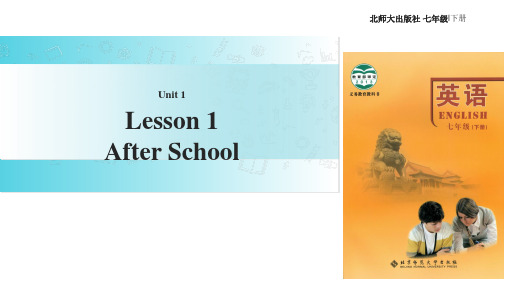
老师进来时全班起立。
[Practice]
Complete the sentences.
北师大出版社 七年级|下册
1. 他们早上7点半起床。 They ____g_e_t_ __u_p____ at half past seven in the morning. 2. 请站起来。 Please __g_e_t_/_s_ta_n_d_____u_p_.
• You have to believe in yourself. That's the secret of success. 人必须相信自己,这是成功的秘诀。
•
北师大出版社 七年级|下册
take a shower
wash your face
北师大出版社 七年级|下册
watch TV
北师大出版社 七年级|下册
Guessing game
北师大出版社 七年级|下册
I have no feet, but I can walk. I have no mouth, but I can speak to you every day. Tick, tick, tick …
What time is it?
北师大出版社 七年级|下册
北师大出版社 七年级|下册
2. go to school
go to school 表示 “去上学”。如: Students go to school at 8 o’clock in the morning. 学生们早上8点去上学。
北师大出版社 七年级|下册
[拓展] 表示“睡觉”常用 go to bed。如: My father often goes to bed very late. 我爸爸经常很晚才睡觉。
北师大 英语 七年级 下册 Unit 1 Lesson 1 After school课程教学设计

教学过程(表格描述)教学阶段教师活动学生活动设置意图技术应用时间安排Step 1 Warm up Show a video about theirafter-school activities andencourage Ss to answer thequestions.1、What do you do afterschool?2、How often do you---?3、What other activitiesdo you do afterschool?Present the new words, suchas , always, often etc.Watch the video andanswer the questions.Possible answers:I play computer games.I play it every day.引出话题,激活已知,激发兴趣,引出生词。
MV和多媒体课件8’Step 2Pre-listening 1.Show a picture of Steveand introduce him andhis schedule to Ss byasking some questionsabout the schedule.What does Steve do onWednesday?2.Encourage Ss to look atSteve’s schedule and topredict the missinginformation aboutSteve’s schedule.1.Look at Steve’sschedule and answerthe questions2.Predict the missinginformation3.Discuss their guessingin pairs根据Steve的时间安排表,预测缺失的信息,为听力活动做好铺垫。
北师大版英语七年级下册Unit 1 Lesson 1 After School 教案

Unit 1 Daily Life Lesson 1 After School教案教学内容:北师大版英语七年级下册Unit 1 Daily Life Lesson 1 After School部分内容。
教学目标(Objectives):1.确保学生认识和理解一些基本单词的意义和简单口头运用(To learn the meaning and simple usages of some words and phrases)。
2.学习使用本单元重点句型及表达(To use the typical sentences to express)。
3.鼓励学生大胆发言及表达(To encourage the students to express bravely)。
4.培养学生对英语学科的兴趣(To make the students interest in English learning)。
5.增强学生听说读写译的能力(To strengthen the ability of listening, speaking, reading, writing and translating)。
教学重点(Key Points):在学习了单词的基础上,以单词为载体,进行主要句型的学习,并了解其中的语法现象,根据具体情境,学会交流对话,侧重句型语法学习,交际意向和课外拓展为重点。
教学方法:游戏,音频,情景教学法,Pair-work两人小组活动,Group-work小组活动,多媒体辅助教学。
教学难点:学生处于初中阶段,对英语有了初步了解,有了一定的词汇储备,对于七年级下学期学生的要求重点是在会读会说的基础上,能掌握一些基本单词的拼写和造句,了解一定的语法内涵,与人进行简单沟通交流。
教学准备:课件、照片素材、音频文件、教学道具。
教学设计:Step1. GreetingStep2.Warm-up/Leading(热身/课程导入)Warm-up Question1)What do you do after school? Discuss in groups and make a list.(eg: read books , play basketball)2)After-school Activities Survey:How often do you play sports after school?How often do you do homework with your friends?How often do you watch TV in the evening?...Step3.Presentation(呈现新课)1.Words Learning!1)老师放映课件,用中文询问同学看到了什么?同学们会看到课件上呈现的图画。
七年级英语下册Unit1DailyLifeLesson1AfterSchool
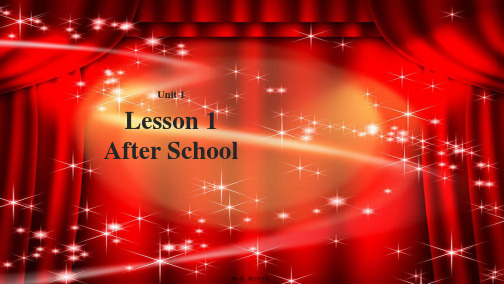
get up
北师大出版社 七年级|下册
go to bed / sleep
第四页,共三十六页。
go to school
北师大出版社 七年级|下册
have breakfast / lunch / dinner
第五页,共三十六页。
have a class
北师大出版社 七年级|下册
make your bed
学生们早上(zǎoì shang)8点去上学。
第二十六页,共三十六页。
北师大出版社 七年级|下册
[拓展] 表示“睡觉”常用(chánɡ yònɡ) go to bed。如: My father often goes to bed very late.
我爸爸经常很晚才睡觉。
第二十七页,共三十六页。
北师大出版社 七年级|下册
Language points
1. get up get up 意为“起床”。如:
I get up very early in the morning. 早晨(zǎo chen)我起床很早。
When do you get up this morning?
你今天早上几点钟起床的?
第二十三页,共三十六页。
•a quarter past eight eight thirty / half past eight
eight forty / twenty to nine •eight forty-five
•fifteen to nine
•a quarter to nine
第二十二页,共三十六页。
北师大出版社 七年级|下册
feed animals, plant flowers, chat, …
北师大出版社 七年级|下册
北师大 英语 七年级 下册 Unit 1 Lesson 1 After school教学课件(共14张PPT)

Homework
Finish the report on my friend’s afterschool activities.
A SURVEY ON AFTER-SCHOOL ACTIVITIES
NAME:______
1. What do you often do after school?
Sure. OK. What do you often do after school? -- Do you ---? -- How often do you---? -- What about---?
Lesson 1 After school
Free talk: What do you do after school? How often do you …?
Steve’s schedule A man is interviewing Ste and check:
clluubb
babsakseketbtbaallll
nneewwss
Listen to the interview Read the interview
Our school is going to do a survey on students’ after-school activities. They want to know what you do after school.
Can you say the following now? Tick( ) or cross( ) them?
I can tell others my after-school activities. () I can ask others about their after-school activities. () I can understand(理解) “always, usually, sometimes, seldom, never”. ( )
七年级英语下册 Unit 1 Daily Life Lesson 1 After School教案 (新版)北师大版

亲爱的同学:这份试卷将再次记录你的自信、沉着、智慧和收获,我们一直投给你信任的目光……学习资料专题Unit1 Daily LifeLesson 1 After SchoolThis lesson is the first lesson of unit 1, unit 1 of the textbook in the seventh grade of Beijing normal university. The topic is the extracurricular life. This unit is entitled daily life, mainly discussing the students' after-school life and the life of the fireman, so as to lay a preliminary language foundation for the final comprehensive language output of this unit.【知识与能力目标】Identify and accurately describe the new vocabulary in this lessonAccording to the information obtained, orally describe the various activities that Steve did during his spare time from Monday to Friday【过程与方法目标】To summarize and refine the dialogue information, to understand the meaning of frequency adverbs in the dialogue【情感态度价值观目标】Learn to communicate with others about daily life【教学重点】1. Identify and accurately describe the new vocabulary in this lesson2. According to the information obtained, orally describe the various activities that Steve did during his spare time from Monday to Friday【教学难点】To summarize and refine the dialogue information, to understand the meaning of frequency adverbs in the dialogueTape recorder, MultimediaStepⅠ Lead-inUse pictures to show the state of daily lifeTalk about the pictures. Introduce the topic of this unit to stimulate students' interest in the topic.Such as brush your teeth, do exercises, do your homework, get upStepⅡ Work in pairs.Tell your partner your routines. Ask the students to answer the question.In the morning, I get up, make my bed and have breakfast.In the evening, I do my homework. …StepⅢ Free talkWhat do you often do in a day?Look at the pictures and discuss: What does he do after school? What are some other after-school activities?Guessing gameLanguage points:1.get upget up 意为“起床”。
七年级英语下册Unit1DailyLifeLesson1AfterSchool教案(新版)北师大版
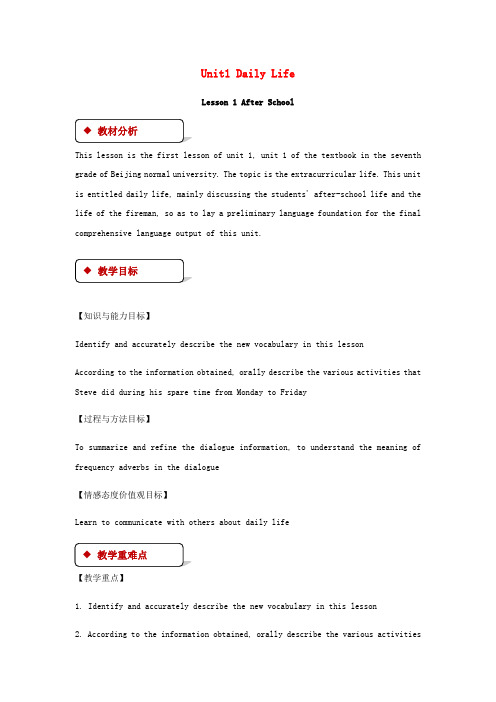
Unit1 Daily LifeLesson 1 After SchoolThis lesson is the first lesson of unit 1, unit 1 of the textbook in the seventh grade of Beijing normal university. The topic is the extracurricular life. This unit is entitled daily life, mainly discussing the students' after-school life and the life of the fireman, so as to lay a preliminary language foundation for the final comprehensive language output of this unit.【知识与能力目标】Identify and accurately describe the new vocabulary in this lessonAccording tothe information obtained, orally describe the various activities that Steve did during his spare time from Monday to Friday【过程与方法目标】To summarize and refine the dialogue information, to understand the meaning of frequency adverbs in the dialogue【情感态度价值观目标】Learn to communicate with others about daily life【教学重点】1. Identify and accurately describe the new vocabulary in this lesson2. According to the information obtained, orally describe the various activitiesthat Steve did during his spare time from Monday to Friday【教学难点】To summarize and refine the dialogue information, to understand the meaning of frequency adverbs in the dialogueTape recorder, MultimediaStepⅠ Lead-inUse pictures to show the state of daily lifeTalk about the pictures. Introduce the topic of this unit to stimulate students' interest in the topic.Such as brush your teeth, do exercises, do your homework, get upStepⅡ Work in pairs.Tell your partner your routines. Ask the students to answer the question.In the morning, I get up, make my bed and have breakfast.In the evening, I do my homework. …StepⅢ Free talkWhat do you often do in a day?Look at the pictures and discuss: What does he do after school?What are some other after-school activities?Guessing gameLanguage points:1.get upget up 意为“起床”。
北师大版七下英语 Unit 1 Lesson 1 After School 提升
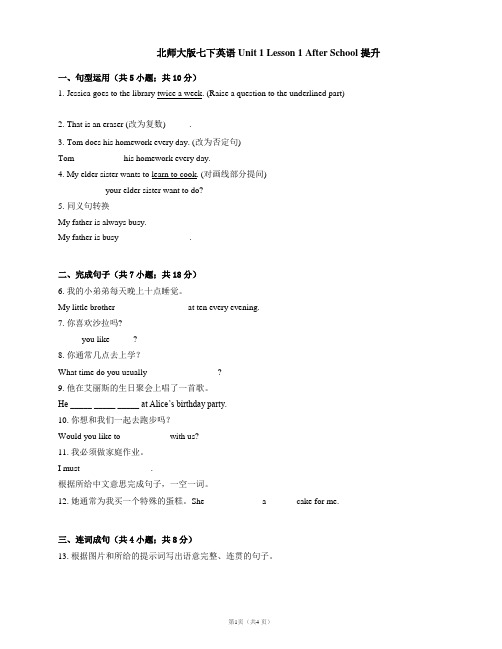
北师大版七下英语 Unit 1 Lesson 1 After School 提升一、句型运用(共5小题;共10分)1. Jessica goes to the library twice a week. (Raise a question to the underlined part)_____2. That is an eraser (改为复数) _____.3. Tom does his homework every day. (改为否定句)Tom _____ _____ his homework every day.4. My elder sister wants to learn to cook. (对画线部分提问)_____ _____ your elder sister want to do?5. 同义句转换My father is always busy.My father is busy _____ _____ _____.二、完成句子(共7小题;共18分)6. 我的小弟弟每天晚上十点睡觉。
My little brother _____ _____ _____ at ten every evening.7. 你喜欢沙拉吗?_____ you like _____?8. 你通常几点去上学?What time do you usually _____ _____ _____?9. 他在艾丽斯的生日聚会上唱了一首歌。
He _____ _____ _____ at Alice’s birthday party.10. 你想和我们一起去跑步吗?Would you like to _____ _____ with us?11. 我必须做家庭作业。
I must _____ _____ _____.根据所给中文意思完成句子,一空一词。
12. 她通常为我买一个特殊的蛋糕。
She ______ ______ a ______ cake for me.三、连词成句(共4小题;共8分)13. 根据图片和所给的提示词写出语意完整、连贯的句子。
北师大版七年级英语下册Unit 1 Lesson 1 第2课时教学课件(9张)

Unit 1 Daily Life Lesson 1(第二课时)
Mon. Tue. Wed.
Thur. Fri.
16:00 basketball 19:00 TV-news
16:00 volleyball _19:00____TV-news
16:00 Drum___Club_______ 19:00 TV-news 20:00 TV-football match
Complete the words with er,or or re.
Kate is a doct__________.
Aft_________work,she goes to the sports cent____or
visit her moth___________and fath___________.
Work in pairs:
Interview your partner and then complete the table with the words always,usually,sometimes,seldom,
never.
Complete the table with often,usually,sometimes,seldom or never
They play comput__________games togeth_____________.
这一 样个 的人 人所 才受 有的 学教 问育 。超
过 了 自 己 的 智 力 ,
You made my day!
我们,还在路上……
study
3.I usually__________my notes first and then ____do_____my homework.
2019教育北师大版七年级下册英语课件:Unit 1 Lesson 1精品英语

北师大出版社 七年级|下册
[拓展]
get up还有“站起, 起立”之意,相当于stand up。如: All the students get up.
所有的学生都站起来了。 The class got up when the teacher came in.
老师进来时全班起立。
[Practice]
那个电视剧怎么样? (3) 用来向对方提出建议或请求, 相当于 Would you like to ...? 。如: What about going out for a walk?
出去散散步好吗?
北师大出版社 七年级|下册
[拓展] How about ...? 意为“……怎么样?”,也常用于
提出建议或征求对方的意见, 相当于What about ...?。如:
go to bed / sleep
go to school
北师大出版社 七年级|下册
have breakfast / lunch / dinner
have a class
北师大出版社 七年级|下册
make your bed
play sports
北师大出版社 七年级|下册
take a shower
口语中常用的一个句型,后面可接名词、代词 或动词-ing形式。其主要用法如下:
(1) 用来向对方询问情况或打听消息。如: I’m twelve years old. What about you? 我十二岁, 你呢?
北师大出版社 七年级|下册
(2) 用来征询对方的看法或意见。如: What about the TV play?
I don’t have any hobbies. How about you? 我没有任何爱好,你呢?
北师大版七年级英语下册Unit 1 Lesson 1 第1课时教学课件(28张)

listen to the dialogue two times again and answer the questions
1.When does Steve play basketball?
2. What doesn’t Steve do on Wednesday? 3.Who does Steve study with?
Try to role- play the dialogue according to the table
Mon. Tue.
16:00 basketball
19:00 TV-news
16:00 volleyball
1_9_:0_0__TV-news
Wed. Thur.
16:00 Drum__C_lu_b__ 19:00 TV-news 20:00 TV-football match
16:00 _b_a_s_k_e_tb_a_l_l _ 19:00 TV-news
Fri.
16:00 football
news
Circle the letters on the survey
After-school Activities Survey Name:Steve
1.How often do you play sports after school?
a) always b) usually c) sometimes d)seldom e) never
1.When does Steve play basketball?
He plays basketball on Monday and Thursday.
2.What doesn’t Steve do on Wednesday? He doesn’t play sports on Wednesday.
2018秋期七年级英语下册Unit1DailyLifeLesson1AfterSchool课件北师大版

北师大出版社 七年级|下册
What are some other after-school activities? go to the cinema, play ping pang, play tennis, play chess, run, do homework, jog, feed animals, plant flowers, chat, …
Unit 1
Lesson 1 After School
北师大出版社 七年级|下册
Talk about the pictures.
brush your teeth
do exercises
北师大出版社 七年级|下册
do your homework
get up
北师大出版社 七年级|下册
go to bed / sleep
4. activity activity n. 活动 复数 activities
北师大出版社 七年级|下册
play basketball
listen to music
read books
play football
fly kites
do after-school activities
北师大出版社 七年级|下册
Look at the pictures and discuss
What does he do after school?
What time is it?
北师大出版社 七年级|下册
8.00 a.m.
7.55 p.m.
10.10 a.m.
12.20 p.m.
2.30 p.m.
11.15 p.m.
What time is it?
七年级英语下册 Unit 1 Daily Life Lesson 1 After School教案 (新版)北师大版

Unit1 Daily LifeLesson 1 After SchoolThis lesson is the first lesson of unit 1, unit 1 of the textbook in the seventh grade of Beijing normal university. The topic is the extracurricular life. This unit is entitled daily life, mainly discussing the students' after-school life and the life of the fireman, so as to lay a preliminary language foundation for the final comprehensive language output of this unit.【知识与能力目标】Identify and accurately describe the new vocabulary in this lessonAccording to the information obtained, orally describe the various activities that Steve did during his spare time from Monday to Friday【过程与方法目标】To summarize and refine the dialogue information, to understand the meaning of frequency adverbs in the dialogue【情感态度价值观目标】Learn to communicate with others about daily life【教学重点】1. Identify and accurately describe the new vocabulary in this lesson2. According to the information obtained, orally describe the various activities that Steve did during his spare time from Monday to Friday【教学难点】To summarize and refine the dialogue information, to understand the meaning of frequency adverbs in the dialogueTape recorder, MultimediaStepⅠ Lead-inUse pictures to show the state of daily lifeTalk about the pictures. Introduce the topic of this unit to stimulate students' interest in the topic.Such as brush your teeth, do exercises, do your homework, get upStepⅡ Work in pairs.Tell your partner your routines. Ask the students to answer the question.In the morning, I get up, make my bed and have breakfast.In the evening, I do my homework. …StepⅢ Free talkWhat do you often do in a day?Look at the pictures and discuss: What does he do after school? What are some other after-school activities?Guessing gameLanguage points:1.get upget up 意为“起床”。
- 1、下载文档前请自行甄别文档内容的完整性,平台不提供额外的编辑、内容补充、找答案等附加服务。
- 2、"仅部分预览"的文档,不可在线预览部分如存在完整性等问题,可反馈申请退款(可完整预览的文档不适用该条件!)。
- 3、如文档侵犯您的权益,请联系客服反馈,我们会尽快为您处理(人工客服工作时间:9:00-18:30)。
Unit1 daily life
Lesson 1 after school 第1课时
Teaching contents:
话题: after school
词汇:
Getting Ready: daily , routine, tooth, sleep, wash, face, go to school, go to bed , get up , make one’s bed, take a shower. Teaching aims: 1. 辨认并准确说出本课所学新词汇;
1
s Ss to look at the pictures on the screen , and leads in the topic of this unit.
·Let the students Look at the table and help them
2. 通过听获取Steve周一至周五课余时间从事各种活动的相关细节信息;
3. 依据获取的信息,口头描述Steve周一至周五课余时间从事的各种活动;
4. 归纳、细化对话信息,初步了解频度副词在对话中的含义。
Key points:
教学重点:通过朗读、小组合作学习活动等方式掌握词汇,理解课文意思。
